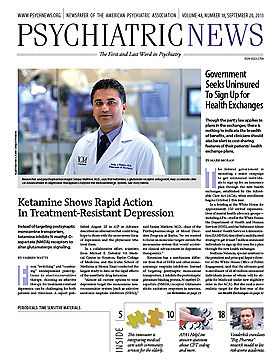Though it is the leading cause of death among the general population, cardiovascular disease poses a greater risk to people with severe mental illness (SMI)—reducing life expectancy by at least 25 years, according to the Centers for Disease Control and Prevention (CDC). Fortunately, researchers at the Geisel School of Medicine at Dartmouth may have found an approach that they believe will help prolong life in those at highest risk for vascular mortality.
The approach, described in the August Psychiatric Services, is the In SHAPE program, a fitness- and health-mentoring program designed to improve cardiorespiratory fitness, physical fitness, and weight loss among overweight and obese adults with SMI.
“Changing health behaviors including exercise and nutrition are important steps in addressing this health disparity,” lead author and director of Dartmouth Centers for Health and Aging, Stephen Bartels M.D., told Psychiatric News.
According to Bartels, previous studies have yielded disappointing results by focusing primarily on weight loss through dietary restrictions to achieve clinically significant cardiovascular risk reduction among SMI patients. He explained that numerous factors can contribute to this lack of success—including metabolic burdens of antipsychotics, lack of motivation due to the mental illness, difficulty affording healthy foods, and inadequate access to fitness centers.
The In SHAPE program addressed these issues by allowing free access to a fitness club with health mentors who met with the patients once a week to provide personalized fitness plans and reinforce physical activity. In addition, participants partook in cooking classes, grocery-store tours, and weekly sessions with a registered dietician.
The sample size included 133 adults with SMI and a body mass index (BMI) over 25. The patients were randomly divided into two groups—In SHAPE or active control. The control group received a one-year free fitness club membership and health education materials but lacked one-on-one mentoring.
Both groups were evaluated on changes in cardiorespiratory fitness—as accessed by the six-minute walk test—and weight loss. Positive changes in physical activity and dietary behaviors were also analyzed. All participants were assigned to the same gym and were required to be stable on psychiatric medication at least two months prior to the study. Psychiatric disorders of the study subjects included major depression, bipolar disorder, schizoaffective disorder, and schizophrenia. Diagnoses were based on the Structured Clinical Interview for DSM-IV.
After 12 months, In SHAPE participants overwhelmingly increased cardiorespiratory fitness to a greater extent than their control counterparts—as indicated by the In SHAPE group’s ability to cover five times as much distance during a six-minute walk test as controls. Forty percent of the In SHAPE subjects achieved clinically significant improvement in cardiorespiratory fitness, compared with 20 percent in the control group.
Though there was no mean difference in weight loss among the two groups, In SHAPE participants were more than twice as likely to achieve both weight loss and cardiovascular health. In addition, In SHAPE participants were more likely to be consistent in physical activities and showed more awareness of steps needed to improve their dietary behavior than did the comparison group.
“Our results demonstrate that a health-mentor intervention may help to overcome the motivational challenges and low self-efficacy often experienced by persons with SMI,” the researchers said.
Though study outcomes were promising, Bartels did acknowledge limitations, such as subjects’ homogeneity in gender, race, and location. “We are currently writing up the results of a second randomized controlled trial of In SHAPE in a more ethnically diverse population, which has an 18-month follow-up. This replication study will be helpful in confirming In SHAPE as an evidence-based practice and its effectiveness in a different and highly representative population,” said Bartels.
The study was funded by the CDC and National Institute of Mental Health. ■

